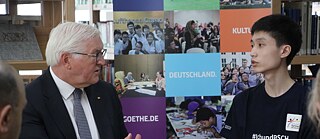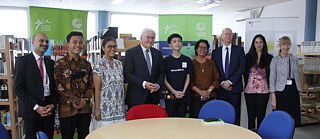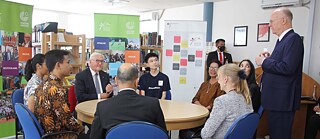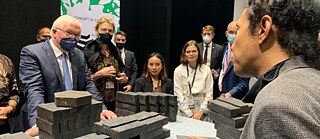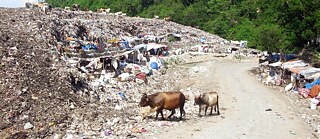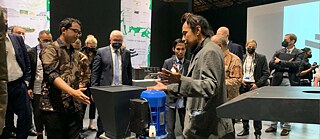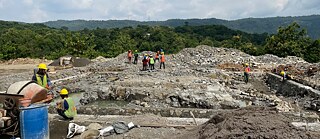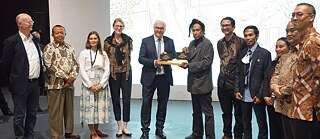President's visit
German Federal President Steinmeier Visits Indonesia
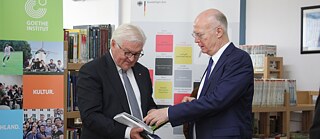
From 15 to 17 June 2022, German Federal President Frank-Walter Steinmeier visited Indonesia in the framework of an official visit on the occasion of 70 years of German-Indonesian diplomatic relations. The three-day itinerary also included an exchange about the PASCH initiative and a visit to the Jogja National Museum in Yogyakarta, where the German President was introduced to the Monumen Antroposen project supported by the Goethe-Institut.
On 16 June, President Steinmeier visited the Jakarta German School, where in 2008 as Foreign Minister he launched the initiative “Schools: Partners of the Future” (PASCH), which laid the foundation for a worldwide network that would motivate young people to learn German over the long term and sustain strong structures for high-quality German instruction. Much has happened since the launch 14 years ago: PASCH has become a success story with more than 2,000 schools worldwide now taking part in the initiative. In Indonesia alone the network includes 29 FIT schools, 1 DAS school, and 3 DSD candidate schools. Indonesia is thus the country with the third most FIT schools.
During his visit to the German School, Steinmeier participated in a discussion with representatives of the Indonesian PASCH community in the library at the invitation of the Goethe-Institut. Participants included a PASCH teacher who is also a PASCH alumna, a retired school principal of the secondary school SMA N 1 Ambon, a PASCH graduate of SMA N 3 Mataram, and a pupil of Saint Peter’s School in North Jakarta who won this year’s national German Olympics and will travel to the international German Olympics in Hamburg. The PASCH participants spoke about their experiences in the initiative and how it has influenced their lives.
Federal President Frank-Walter Steinmeier was visibly delighted to return to the place where he launched the initiative:
Together we can be proud that the initiative has developed into a global network of around 2,000 schools in 120 countries. The excellent support that the Goethe-Institut has provided for this network is very gratifying, and I am confident that the initiative will continue to spark young people’s interest in Germany and the German language in the years to come.
Frank-Walter Steinmeier
Monumen Antroposen — a landmark for a sustainable recycling economy
The next day President Steinmeier traveled to Yogyakarta in Central Java, a city of historical and cultural significance. He stopped by the Jogja National Museum and became informed about the Monumen Antroposen (Anthropocene Monument) project that was initiated in 2021. The Monumen Antroposen is an activist and collective art project that brings together artists, scientists, environmental activists and people from all walks of life concerned with environmental issues, sustainability and the promotion of a recycling economy. The main focus of the project, which is jointly implemented by the Indonesian Upcycle Forum (IUF) and the local government, is to advocate a clean and healthy environment, to increase the income of the socially disadvantaged, and to ensure better health for everyone. Monumen Antroposen is supported by Goethe-Institut Indonesien and funded by the Creative Industries Fund of the Foreign Office.The central component of Monumen Antroposen is a work of public art intended to be a positive force in the community. The work will be erected as a three-story monument in the village of Bawuran. Preparations for the structure are already in high gear. A unique architectural feature of the monument is that it is constructed with blocks made of compressed plastic from a mountain of garbage only about 200 meters away.
In their form, the building blocks are similar to those of the World Heritage site of Prambanan, one of the largest Hindu temples in Southeast Asia dating back to the 9th century. The history of the Anthropocene epoch is milled by artists as a relief into the walls of the Monumen Antroposen. It is an artistic contemplation of the epochs of human resource utilization: on the first level the Holocene, in the center the Anthropocene, and above is the Circular Economy as a positive utopia. The monument is placed on a hill surrounded by a tropical, hilly forest landscape which is broken on one side by a mountain of garbage. The monument is situated on the border between a civilization wound and intact nature.
Federal President Steinmeier was able to gain a first impression of the production process during the tour of the National Museum. As part of their presentation, the curators of Monumen Antroposen showed a plastic extrusion machine that will be used at the monument to mold recycled plastic into building blocks and other products.
Regional Director of Goethe-Institut for Southeast Asia, Australia and New Zealand Stefan Dreyer, who accompanied the German President both to the exchange with PASCH representatives and to Yogyakarta, expressed his pleasure with the delegation’s interest in the work of the Goethe-Institut in Indonesia at the conclusion of the visit. “We are very pleased that, despite a packed schedule, Federal President Steinmeier was also able to include two important project initiatives of the Goethe-Institut as part of his state visit. We also see this as an appreciation and encouragement of our work in the region,” underlined Dr. Dreyer.
